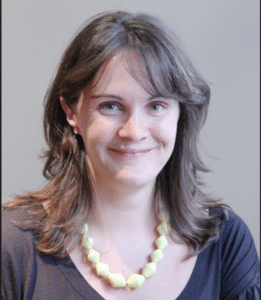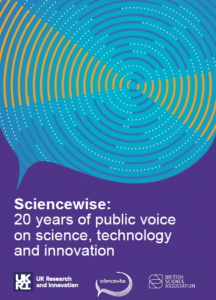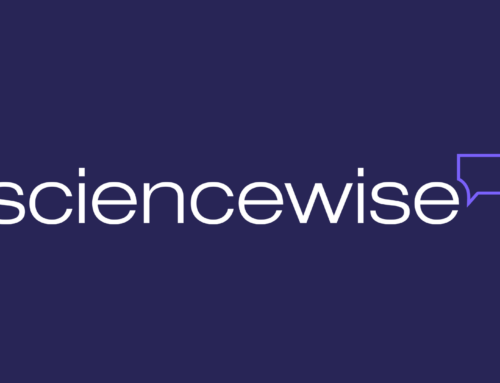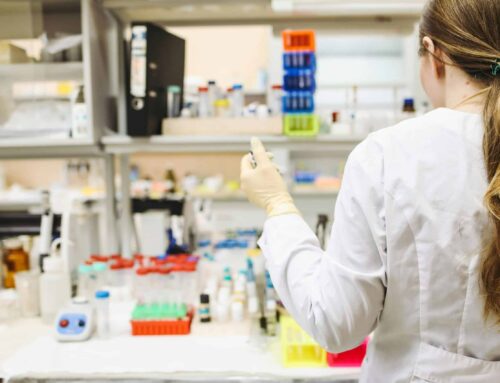As the Sciencewise programme enters a new period, outgoing Sciencewise Programme Director — Sarah Castell — shares some words of thanks and reflections on the past and future of the programme.

Looking back: the last 20 years of Sciencewise
The Sciencewise programme, established in 2004, has spent the past two decades fostering public dialogue and engagement in science and technology policy and research in the UK. Over these 20 years, Sciencewise has played a crucial role in ensuring that the voices of ordinary citizens are considered in policy-making processes and bringing public judgement to decisions about scientific research. The programme has shifted the dial on our understanding of where power and agency should lie, when we — as a society — make decisions about the role of science and tech in our futures.
Through over 75 public dialogues, engaging over 8,000 members of the public in some 70,000 hours of in depth deliberation, the programme has enabled diverse groups to engage with complex scientific issues, from climate change to genetic modification. This sustained effort has not only enhanced the transparency and inclusivity of scientific governance but also helped to build public trust in science, research and policymaking.
Thanks are due to so many who have worked hard to achieve Sciencewise’s impacts over the years. Roland Jackson, who served as the Chief Executive of the British Science Association before becoming involved with Sciencewise, contributed significant leadership and vision to the programme’s development. Kathy Sykes, Professor of Sciences and Society at the University of Bristol, was also instrumental in getting the programme off the ground. The teams who have stewarded the programme, first from BEIS and then from UKRI, have demonstrated commitment and passion for bringing the public voice into the world of scientific research and policy. And in the delivery of the programme, expertise, care and commitment from a number of dialogue and engagement specialists and evaluators has been at the heart of its success. I want to give a special mention to Diane Beddoes and Suzannah Lansdell who have delivered so much of the work over recent years, Diane Warbuton who shaped the guiding principles and evaluation of the programme, and to our recently departed colleague, the inspirational Simon Burall, who led the delivery of the programme and sadly passed away earlier this month. I would also like to thank Erinma Ochu, Madeleine Gabriel, Fionnuala Ratcliffe, Stephen Robinson and all the other Dialogue and Engagement Specialists who have offered invaluable contributions and insights to the programme through quality assurance and dialogue and engagement support.
Looking forward: what’s next for Sciencewise
As it celebrates its 20th anniversary, Sciencewise continues to evolve, adapting to a rapidly changing landscape of science and technology. Involve, the British Science Association and NCCPE are delighted to take on the delivery of the next six years of the programme.
The new-look Sciencewise will include three programme accelerators — boosts for key areas where public dialogue, and engagement more generally, needs to evolve and develop. The first will centre innovation as part of Sciencewise, to broaden the methods used and diversify the commissioning bodies who can take part. The second will develop a power, voice and equity strategy, building on the dialogues of the twenty years of Sciencewise where power and equity has been a consistent theme. Members of the public in dialogues return again and again to the question of who holds knowledge about, and power to decide on, the uses of science and technology in society. The third accelerator is planned to build more lasting relationships and greater capacity for ongoing public engagement, moving beyond one-off dialogues to longer term cultures of engagement.
We also see huge potential for the programme to take advantage of the key moment of a new government. Sciencewise can connect the wider science and tech ecosystem to the public’s views on the emerging issues of the day.
And in terms of supporting policymaking, the new government is framing its challenge in government around five ambitious missions. To deliver on these cross cutting challenges will require: an understanding of scientific and technological capability; effective, evidence based policymaking; and critically, buy-in of the public for new policies or changes. Sciencewise can help the public explore the tradeoffs around different risks and opportunities — therefore government can develop policies around science and technology that truly work in the service of our society and rebuild public trust.
To read more about Sciencewise over the last 20 years, check out the report from our 20th anniversary events:






